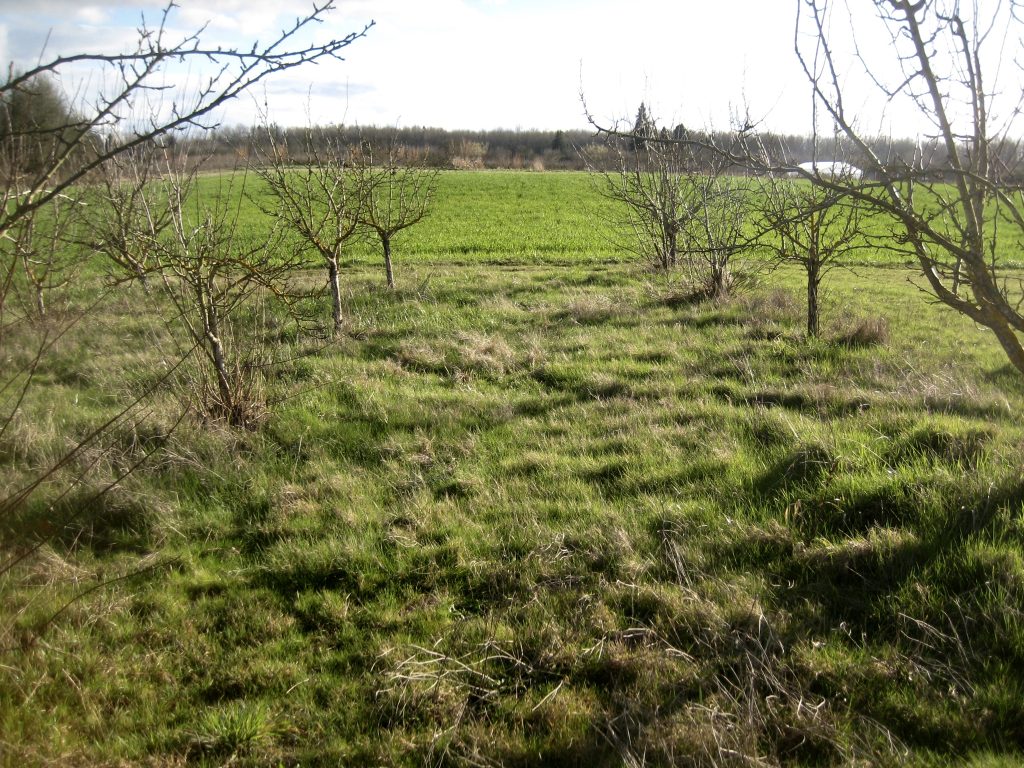Many years ago, before we starting our farming venture, I helped operate the kitchen at a remote mountain retreat center called Holden Village. In the kitchen, we had a motto that guided our days: “It’s not about the food …” was posted visibly in our office, near our shelves full of cooking books (whose presence seemed to imply that maybe our jobs were about the food after all).
Obviously, food was our primary work. We cooked three meals a day for a community that ranged in size from 70 in the winter to 500+ in the summer! We would regularly chop ten gallons of onions for one meal. I know, because we’d do all the veggie prep the day before and measure and store them in five gallon buckets in our walk-in cooler. That’s a lot of onions. We even kept a pair of goggles around for the onion chopper to wear during his or her task.
But, even though our work was obviously to prepare food, we actively recognized that food isn’t about the food. Food is so much more than just some material stuff on a plate that we put into our bodies as fuel. Food is about pleasure. Aesthetics. Adventure. Politics. Culture. Family. And, perhaps most importantly to us, food is about connection. At that retreat center, we sat down together to pray and then eat three meals a day. One or two of those meals, every day, was served “family style,” with the dishes of food served in the middle of each table set for eight people. Each individual diner would take a portion and pass the contained, keeping in mind the importance of making sure everyone received a share, all the while making happy conversation about their day. That act of breaking bread together was a physical manifestation of the retreat center’s larger mission of connection, community, and faith. And, it was important as a kitchen staff for us to remember that our work was just as sacred as the pastor and worship team’s work — that by literally setting places at the table for our guests, we welcomed them into an experience with infinite layers of meaning. It was profound work to be doing, even if some days it felt like we were just chopping onions and laying spoons on tables and slicing bread.
In our work as farmers, I think we’ve carried over this philosophy. Certainly, our work is about the food — the CSA wouldn’t exist without the kale and carrots that Casey diligently harvests each week. And yet, our work is about so much more as well …
This afternoon we arrived back from two nights at Breitenbush Hot Springs, a different mountain retreat center that we visit every February for an annual gathering of farmers. We soak in the hot springs together, eat food over lively conversation, and sit on the floor to share all about the challenges and joys of the work we do — sometimes we discuss nitty gritty detail about fertilizer application and sometimes we ponder the bigger picture of why we do this work to begin with. Often we talk about our love for the work and for what it brings into our life. It’s a wonderful opportunity for us farmers to take stock, connect, and remember what brought us to these choices years ago.
What kept coming up in my mind when I thought about our work is all of you and the interactions we get to enjoy at our CSA pick-up. Can I just say that we love how we operate our CSA, with its self-serve pick-up style that allows people to meet and mingle with each other and us??? Obviously, we chose it intentionally all those years ago, deeply inspired by our experiences at Holden Village and its focus on community building. Never ever did we think we would enjoy packing up boxes to ship off to faceless customers. We wanted the farm to be a nexus for interactions. We wanted to meet the people who would eat our food! The relationships that have flowed from that choice have exceeded our dreams, especially as they continue to grow in depth year-after-year.
What these relationships lack in depth, they make up for in breadth, in repetition, in time. After watching our customers’ children grow over the last decade, there is a different kind of connection that grows. There is a care that comes from simply seeing each other in person each week. In that way, growing these vegetables and harvesting them feels a bit like a little prayer for our community each and every week. We can’t help but think of you all as we go about our work, calling to mind who will be especially excited about a new crop or remembering another CSA member who might be struggling with life that week.
In 2006, when we started this whole business, I’m not sure I fully anticipated the unique role the pick-up itself would come to play in our farming experience. I also could never have anticipated the way society would change around us. A common topic of conversation among people these days seems to be how physical in-person interactions with our community appears to be declining. Certainly people still see their good friends or their family, but many people have decreasing numbers of community interactions that are less intimate — that bring them into contact with people they might not otherwise visit with. Schools can still serve this role for many people who are parents, but other former such institutions are waning: churches, clubs, and other social activities. A friend who has been involved on Linfield’s campus since 2007 has noticed a marked drop in student participation and leadership in activities corresponding to what appears to be a big increase in cell phone and social media use. This tracks national and generational trends.
At our farmer gathering, a farmer from tiny little Waldron Island in the San Juans reported a similar trend. On that island (year-round population of 100 people), residents used to make a gathering event out of going to the post office to check mail the three times a week it was delivered. Now, with email and easier communication options for residents, getting mail has become less of a priority. A natural community meeting occasion has slowly slipped away, and she reported that the older residents feel the loss most keenly, remembering well what it used to be like in that remote community.
Overall, I actually feel like the greater McMinnville community as a whole works hard to sustain these kinds of connections. I love how many opportunities there are here to connect in person. But it does feel like we have to choose to connect because social media can dangerously “fill” that social need without actually filling it. We can become friends with people who don’t live in our community or we can dangerously find ourselves frustrated with people who do live in our community. The on-screen aspect of communicating can strip people of their humanity and make it harder to forgive or move on from arguments in the same way we often have to do in real-life communities (ideally, anyway!).
Anyhow, as a person who genuinely loves people and finds their stories and experiences fascinating and inspiring, I am continually grateful for the opportunity to interact with you all. Most of you we wouldn’t otherwise know or have regular interactions with, and our life would be less rich as a result! If all we do is connect with people who we immediately like or who have lots in common with us or do the same things all the time, we have fewer opportunities to grow and to learn.
All this from some vegetables! And more! Which is why we always said, “it’s not about the food … ”
That being said, enjoy this week’s vegetables!
Your farmers, Katie & Casey Kulla
~ ~ ~
Meet this week’s vegetables:
- Nettle sauerkraut — We picked the first of the nettles this weekend! They are just coming up, so we didn’t go crazy, but we were very excited about that unique smell and flavor. Every year, we fall even deeper in love with this wild plant. Casey wanted to do something significant with the first of it, and he thought he’d experiment with adding it to a larger ferment. We haven’t taste-tested it yet, but we’re excited!
- Apples — Goldrush and Fuji
- Seasonal salad mix
- Cabbage
- Kale
- Chard
- Marina di Chioggia squash
- Butternut — We want you to know a little cool thing about butternut … as they store over the winter in our special “squash room” (which we keep at room temperature — their preference), butternut start to shrivel a little. This is a natural part of the extended curing process and it means the squash is getting sweeter. So, don’t be afraid of a little shrivel on your butternut! That is a sign that it will be tasty!
- Pie pumpkins
- Spaghetti squash
- Carrots
- Beets
- Sunchokes



